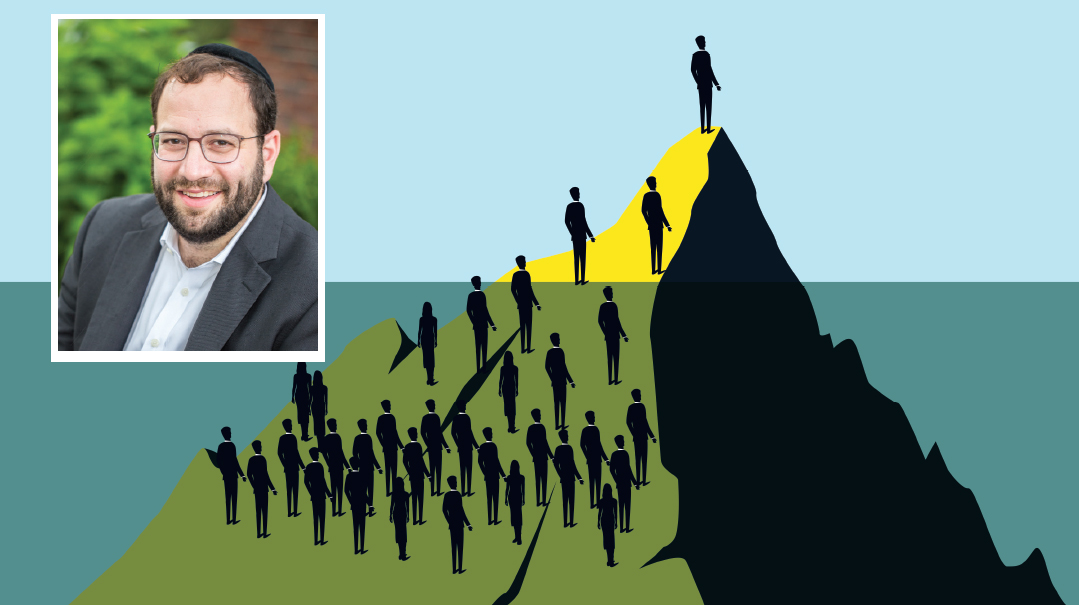Where Have All the Teachers Gone?

The leadership vacuum that should be worrying us all. Three takes on a troubling trend

While the “Fuzzy Math” piece I wrote back in January spurred some lively conversation in these pages, it would be a shame if someone “did the math” and then realized an ideal profession, something that person was really drawn to, didn’t add up to support a frum lifestyle. Sometimes you have to follow your calling and figure things out along the way. But if someone did the math and realized a career in chinuch didn’t add up to support a frum lifestyle, that would be a crime. And if the bottom line is what’s keeping our best and our brightest away from klei kodesh, then we all — from parents to donors, community leaders to roshei yeshivah — have a responsibility to figure out how to make these crucial fields more attractive and sustainable.
Yes, we have a crisis on our hands. Torah Umesorah’s online job board currently has 90 teacher and administrator positions open for the 2021-2022 school year. Administrators around the country speak about the challenge of finding quality candidates to fill limudei kodesh positions, particularly in out-of-town communities — and Monsey, Far Rockaway, and 50 minutes out of Lakewood also count. Candidates interested in teaching younger boys’ elementary grades are scarce, and retaining high school moros — and replacing those who leave with qualified and experienced candidates — has hit crisis mode in many girls’ schools. In the field of kiruv, NCSY, among other outreach organizations, has openings coast to coast for full-time, front-line kiruv work. One major yeshivah in North America, which used to be known as a feeder into community kollels and whose graduates are known to have filled spots in all the major national klal-work organizations, is no longer “sending out” into community kollels or kiruv work. Those going into klei kodesh want pulpit rabbi positions; otherwise, those who leave full-time learning are typically going into business. When avreichim leave the beis medresh these days, it’s Amazon versus chinuch, and Amazon is winning.
What’s going on? Is it the salaries? The rising standard of frum living? The challenging nature of klei kodesh positions?
To illustrate the problem, one director of a kiruv organization shared with me that he recently interviewed two young men from a prominent American yeshivah. Both men told him that they couldn’t recommend any others for outreach positions because they themselves are anomalies. Both have unique backgrounds that led them to be interested in a kiruv position, but they know they are black sheep, pursuing a different path than the generally accepted goals within the system. He was left wondering if outreach is even a value anymore.
Yet on the other hand, one cannot criticize a young man’s desire to support his family and ease the burden off his wife. If an Amazon business or a real estate job is going to allow him to bring in a solid salary that meets the ever-increasing needs of a growing family, and allows him ample time to learn too, then taking care of one’s own may drown out any propensity or personal calling for teaching.
But what about the idealism and sense of achrayus for the klal that might motivate someone to go into kiruv or chinuch? Some say the Israel experience isn’t what it used to be, due to the distractions of technology, in effectively inspiring those who come from more modern backgrounds, for example, to then give back what they gained.
No doubt, the financial demands of the frum lifestyle are great, and seem to be getting greater as the years go by, which is another factor likely motivating earners to pursue more lucrative professions.
In addition, high school teachers have generally stopped talking to girls about “mesirus nefesh for Torah.” In 2021, when we want it all — and can often have it — calls for sacrifice fall on deaf ears. They often hear the message pushed later in seminary, particularly as it applies to supporting their future husbands in kollel, but when it comes time for shidduchim, sacrificing for Torah means supporting a learning husband with a good salary, not a teacher’s salary. Sadly trending these days is that teaching doesn’t look good on a shidduch résumé. Young women deciding not to go into teaching is an unintended yet dire corollary of the push for kollel.
The kiruv field has its own struggles. One might analyze the different factors causing shortages in kiruv and chinuch, but ultimately, they’re both are about the same thing: educating Jews, whether they’re our children or our unaffiliated neighbors.
Many who work in kiruv say the field is prone to burnout, and that people are looking for a growth trajectory and a model of incentivizing that rarely exists. Some wonder if people even view kiruv as a “real profession.” The investment of hours and energy is immense, but the compensation is often not enough (benefits depending on the organization) and does not increase adequately with time in the field. Often kiruv jobs require a move to a small community, with all the challenges that entails. And if the passion and mesirus nefesh is absent from the start, there’s bound to be little interest.
Yet the following statistic should frighten us all: According to the recent Pew Report, 40 percent of Jewish adults under 30 do not identify their religion as Judaism. The question is whether this will cause any reverberations in the yeshivah world, whose graduates are by and large not viewing kiruv as a calling or a profession.
(While shlichus within Chabad is afforded the greatest respect and there is no shortage of potential shluchim — according to Pew, 38 percent of all US Jews have engaged in some way with Chabad — it’s not easy for them either, as every Chabad shaliach still has to raise his own budget.)
AS A MOTHER OF CHILDREN, and as an adolescent and adult educator in the frum community, what concerns me most is the teacher shortage our communities are facing. Our children need much more than warm bodies in a room; more than ever, they need excellent rebbeim and morahs who not only view teaching as their life’s calling but are also equipped with the necessary skills and tools to be effective and to feel satisfaction from what they’re doing day in and day out.
My fifth-grade son’s rebbi this past school year at the Hebrew Academy of Cleveland almost decided to go into business when he moved here. The skills he uses in his classroom — team building, motivation techniques, management skills, technological savviness, and a knack for understanding human psychology — would have served him well in any business setting. After learning, mentoring, and being a meishiv in Eretz Yisrael for 14 years, all the while doing part-time business hustles and eventually working in management full-time, he moved back to the States with his family. An opportunity came his way to give classroom teaching a shot, and he figured it was now or never. While lacking a formal degree in education, he took teacher training programs and was mentored by experienced educators and supported by administrators who recognized his ability.
This is only his second year running his own classroom, but this is a rebbi whose teaching philosophy and methodology reflect some of the best concepts and practices of modern education. My child, and no doubt his classmates, have benefited from his understanding that skill development is not just about future Gemara learning, but about self-confidence; that differentiated learning is necessary to enable every talmid to succeed and take personal ownership of his learning; that engaged, student-centered learning keeps kids too busy to waste time getting into trouble, and that behavior is a reflection of something going on.
It takes a sensitive rebbi to take a cue during class or take time out for a little chat before problems escalate. My son has flourished in this environment, academically, emotionally, and religiously. And his rebbi himself feels fulfilled and accomplished in his work, utilizing his various skills and talents in creative and challenging ways. Is there anything else more valuable for both of them?
If we want talented people to go into education in 2021, the conversation can no longer be about sacrifice. The selling point must adapt to this identity-focused generation, where mission resonates more than mesirus nefesh. For those who have the proclivity for klal work, the message needs to be about finding your personal calling, identifying your passion, and utilizing your skills and talents to both fulfill your potential and contribute to the klal.
And maybe a life devoted to chinuch can’t require the kind of sacrifice of the past because it deters our potential educators of the future. We obviously need teachers; our society cannot function without them. And we need great ones. But we have to get them in the door.
THE GOOD NEWS IS that there are glimmers the market is correcting itself. According to Torah Umesorah, an effort has been made to increase teacher and administrator salaries in schools that recognize the problem and the necessity to do something about it. Yet it’s time for this to be done across the board, not just for the benefit of our current teachers, but for the intended purpose of changing the way chinuch is viewed as a sustainable profession in our communities.
Stakeholders and community leaders need to make this chinuch crisis an urgent priority. We need to take care of our teachers: pay them respectably, train and support them professionally, and recognize and acknowledge them properly. Salaries need to go up, and with that, an increased level of professionalism and accountability in the field. The pay gap between morahs and rebbeim needs to finally be closed.
And any opportunity to augment support of our mechanchim and mechanchos must be utilized: tuition breaks, scholarships for sleepaway camps, bonuses for Yamim Tovim, and benefits, as well as communal and individual tzedakah funds prioritized to respectably support our teachers, ideally via their paychecks (see Torah Umesorah’s Rebbi Initiative). With every resource utilized, including all parsonage allowances, the package offered to a rising chinuch professional doesn’t have to look all that bad.
Most frum families are trying their hardest for the math to add up at the end of the month. For our teachers, on whose shoulders rest the future of our children, let’s figure out a way to help their math add up easier, which will in turn encourage the next generation to consider chinuch as a real option.
Alexandra Fleksher is an educator, a published writer on Jewish contemporary issues, and an active member of her Jewish community in Cleveland, Ohio.
(Originally featured in Mishpacha, Issue 868)
Oops! We could not locate your form.









